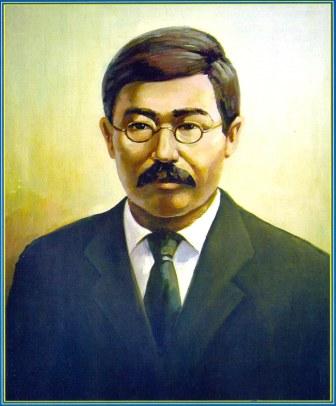Khalel Dosmukhamedov and his legacy

Khalel Dosmukhamedov is one of those who left a special mark on Kazakh pedagogy and education. Having defined the theoretical foundations of Russian pedagogy, Dosmukhamedov invested a lot of work in this area. The fact that his writings have not yet been studied is due to his independent political views, the ideas he affirms, and the road he once took.
Most of his works disappeared without a trace during the years of repression and persecution. The other part, extracted from dusty archives and book repositories, is only now being brought into the system, analyzed and processed by research scientists and is the basis for studying Dosmukhamedov's creative heritage, its place and role in the development of pedagogical science and education.
But not for a moment did he forget his duty as a doctor. He was very fond of children, and always treated them, even during the years of exile, he worked as a children's doctor at school. At the Institute, he was engaged in the education of children, organized the Department of Pedology, later receiving the title of Professor of Pedology. Putting the health of the people at the forefront, Dosmukhamedov, fulfilling his duty, worked hard and fruitfully in this field.
He worked at the Kazakh Institute of education, which was located in Tashkent at that time. The Institute was a solid cultural and educational center, and its role as a center of culture, it was difficult to overestimate. The years of work in Tashkent (1920-1929) were the most fruitful for Dosmukhamedov in creative terms, because it was during this period that most of his works were written and published. Here you can systematize your knowledge obtained at Saint Petersburg University, generalize and Supplement it with the experience of many years of work. Dosmukhamedov did a lot to leave a worthy legacy to future descendants in the field of science and education.
He was actively involved in the creation of a new national school system and the development of Kazakh terminology. Khalel Dosmukhamedov used his teaching experience in preparing textbooks for schools and, as their author, became widely known. Such works as "Inanimate nature", "Textbooks of Zoology" (1922), "Synharmonism in the Kazakh language" (1923), "Hygiene of school children" (1925) and the third part of the textbook of Zoology (1926) were published. These books rightfully occupy a special place in the history of Russian textbooks.
In addition to textbooks, he was actively engaged in translations. He translated and published books by Yu. Wagner's "Stories about how our body is arranged and works", "Stories about how plants live and work". Khalel Dosmukhamedov continued his fruitful teaching experience in 1929 at the newly opened Kazakh pedagogical Institute.
Being in the thick of cultural and educational events of the 20-30s of the XX century, which were particularly significant in the history of the spiritual life of the Kazakhs, Khalel Dosmukhamedov, sharing his observations, often said: "If we want to be cultured, we must choose the right road and get enough food to go on the road. Who does not fuss, and on the Arba will overtake a hare, it is necessary to leave slander, envy, gossip: that said so, and another this way. The Shearer should not compete with the Tulpar, he will not catch up with it. We must remember the saying: "Ayaz bi, know your strength; ant, don't stray from your path." Without too much noise and noise, you need to gain knowledge, purposefully go to the intended goal."
These words of an outstanding personality, such as Khalel Dosmukhamedov, can be called as if they were programmatic: to leave all the strife, United in the pursuit of a single goal - national culture.
Dosmukhamedov represented the most active part of the intelligentsia who participated in the social and political life of the Republic, and in this field gained great fame and popularity. Having proved the importance of national psychology in the formation of the younger generation, he makes a number of proposals for the reform of educational work. His achievements in the development of ethnopedagogics and ethnopsychology are undoubtedly of great interest to researchers. He first developed the scientific and theoretical foundations of national character features.
These views of his concerning the issues of ethnopedagogics and ethnopsychology are reflected in his works on folklore, because Dosmukhamedov saw the origins of national pedagogy and psychology primarily in folk art.
For example, in his writings, he wrote that many features of the national character are expressed in the art of aitys. And in this regard, oral folk art is a source of education, because it is a storehouse of spiritual treasures, a whole science of spirituality.
He said that the existence of an ethnic group, its further development is directly related to the language, especially the language proficiency of children. At the beginning of the XX century, Khalel Dosmukhamedov proposed to develop the language from below, linking it with the spiritual life of the people, seeing in this a manifestation of the eternal renewal of the native language, its immortality.
Kh. Dosmukhamedov, in addition to his main specialty - medicine, was well versed in the problems of anatomy, physiology, Zoology, botany. The scientist paid close attention to terminology, pointing out the special meaning of terms in science. In various of his works, there are many special words created by him.
We admire the current relevance of its provisions and conclusions in the field of ethnopedagogics and ethnopsychology about the place of the native language in the life of the nation. "If vodka, nicotine, and diseases destroy the body, then foreign words forcibly introduced into use destroy the language." "Language is the soul of the people". "A people who do not know the language cannot be called a people." "Knowledge is achieved through language." "A nation that has lost its language will lose itself." "The rich language of an educated people". "The language of a people striving for culture is enriched."

